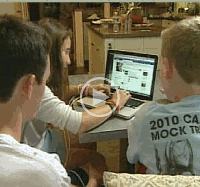
Common Core State Standard
SL.CCS.1/2/3/4 Grades 6-12: An essay of a current news event is provided for discussion to encourage participation, but also inspire the use of evidence to support logical claims using the main ideas of the article. Students must analyze background information provided about a current event within the news, draw out the main ideas and key details, and review different opinions on the issue. Then, students should present their own claims using facts and analysis for support. FOR THE WEEK OF SEP. 19, 2011 Government wants tighter online privacy safeguards for pre-teensFind a technology article, review or ad of interest and tell why it's appealing.
Spot a photo or coverage of anything else pre-teens can't use or do -- at least not without parents.
Look for an age rule at the registration page for interactive forums or reader responses at this paper's site.
National regulators, trying to keep pace with technology advances, wants to tighten privacy rules for computer users under 13. Proposed changes to a law called the Children's Online Privacy Protection Act focus on parental notice, the definition of personal data, security safeguards and other areas. When adopted after comments this fall from businesses, parents, educators and safety advocates, the new Federal Trade Commission rules would cover news and entertainment sites, social media, fan clubs and any other website that gather information through registration or contest entries.
Site operators would have to post clear notices and get parental OK before collecting information from children, offer more ways to obtain that consent in writing, and prove they can protect children's personal information. The government also wants to expand the definition of personal information' to include geographic location and "tracking cookies used for behavioral advertising." That refers to codes identifying computers or handheld devices, which let firms target offers based on sites visited. Changes don't cover teens, as some groups had suggested. Youngsters actually would get a bit more freedom under the pending new rules, which say children can take part in social media, chat rooms and forums without parental consent as long as the operators keep all or nearly all personal data from being made public. Even though Facebook and other interactive sites say users must be older than 13, the age limit is widely ignored. More than 7.5 million under-13s are active users of Facebook, Consumer Reports magazine estimated in June. That group includes more than 5 million younger than 10, according to the respected publication.
Front Page Talking Points is written by
Alan Stamm for NIEonline.com, Copyright 2026
Front Page Talking Points Archive►Australia is a test case for social media age limits, with 16 as a minimum for accounts there now ►U.S. actions at sea against suspected drug smugglers raise military law issues ►Say goodbye to new pennies, a coin that outlived its purpose after 232 years ►Show of force: U.S. naval and air buildup near Venezuela signals possible military action ►Google targets organized scammers in China to block online access ►U.S. government stays away again as global leaders hold yearly climate change strategy session ► Political fight over federal spending nearly interrupts food aid for needy Americans ►Quick removal of White House wing for large ballroom is latest flashpoint for Trump critics |

